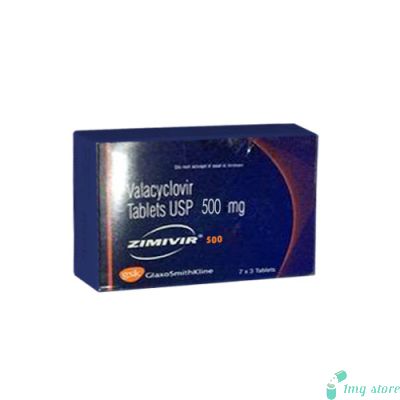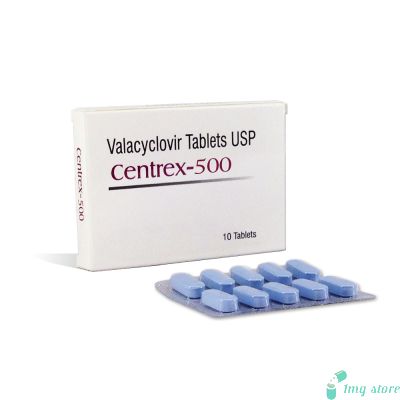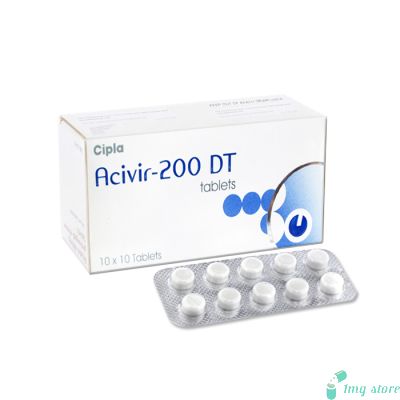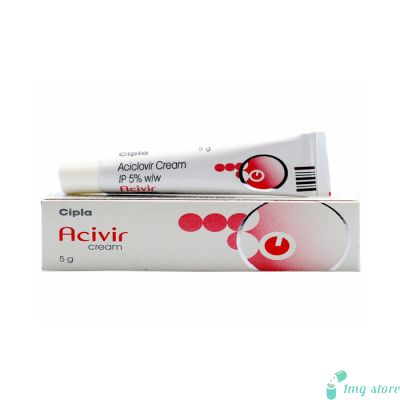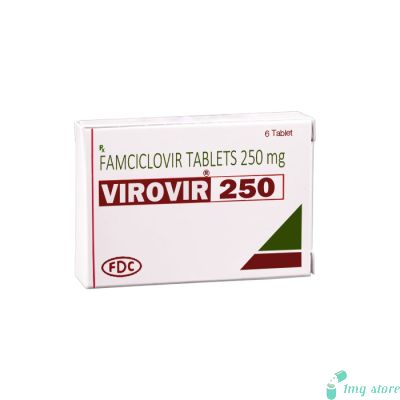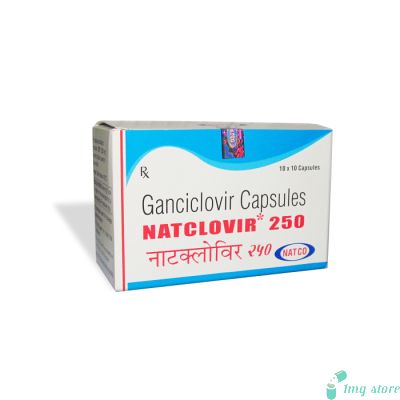Valcivir is a brand name for a medication called Valacyclovir, which is an antiviral drug used for the treatment of various viral infections. It belongs to a class of medications known as nucleoside analogues.
Valacyclovir is primarily prescribed for the management of herpes simplex virus (HSV) infections, including genital herpes (herpes simplex type 2) and cold sores (herpes simplex type 1). It can also be used to prevent recurrent outbreaks of these infections.
The active ingredient in Valcivir, Valacyclovir, is converted into acyclovir within the body. Acyclovir is a potent antiviral agent that works by inhibiting the replication of the herpes virus, thus reducing the severity and duration of outbreaks.
Valcivir tablets are available in different strengths, typically ranging from 500 mg to 1000 mg. The dosage and duration of treatment may vary depending on the specific condition being treated, the patient's age, and the healthcare provider's recommendation. It is usually taken orally with or without food.
Common side effects of Valcivir may include nausea, headache, dizziness, abdominal pain, and fatigue. In rare cases, it can cause more serious side effects such as allergic reactions or kidney problems. It is important to consult a healthcare professional for proper guidance and monitoring while taking this medication.
Valcivir is a prescription-only medication, meaning it can only be obtained with a valid prescription from a healthcare provider. It is important to follow the prescribed dosage and complete the full course of treatment, even if symptoms improve, to effectively manage the viral infection.
Please note that this information is not exhaustive, and it is always recommended to consult a healthcare professional or refer to the medication's package insert for comprehensive instructions and guidance on the use of Valcivir (Valacyclovir).
Here are some of the benefits of Valtrex:
Treatment of Herpes Infections: Valtrex is highly effective in managing herpes infections, including genital herpes (herpes simplex type 2) and cold sores (herpes simplex type 1). It helps alleviate the symptoms associated with these infections, such as pain, itching, and discomfort. Valtrex can shorten the duration of outbreaks and promote faster healing.
Prevention of Herpes Outbreaks: For individuals with recurrent herpes infections, Valtrex can be used as a suppressive therapy to prevent or reduce the frequency of outbreaks. By taking Valtrex regularly as prescribed by a healthcare professional, it can help decrease the number of episodes and make them less severe.
Reduction of Transmission Risk: Valtrex has been shown to reduce the risk of transmitting genital herpes to sexual partners. When taken consistently and as directed, it can lower the chances of spreading the virus to others, especially when used in combination with safe sexual practices.
Convenience of Once-Daily Dosage: Valtrex is often prescribed in a convenient once-daily dosage regimen for the suppression of herpes outbreaks. This dosing schedule increases compliance and simplifies the treatment process.
High Safety Profile: Valacyclovir is generally well-tolerated and has a high safety profile. It has been extensively studied and used for many years, with proven efficacy and low risk of serious side effects when used as prescribed. However, individual reactions may vary, and it's important to consult a healthcare professional for personalized advice.
Potential for Other Viral Infections: While Valtrex is primarily indicated for herpes infections, it may also have some efficacy against other viral infections, such as shingles (herpes zoster) and Epstein-Barr virus. However, the use of Valtrex for these conditions should be determined by a healthcare professional.
When using Valtrex (Valacyclovir), it is important to take certain precautions to ensure safe and effective use of the medication. Here are some precautions to consider:
Consult a Healthcare Professional: Valtrex is a prescription medication, so it should be taken only under the guidance and supervision of a healthcare professional. They will assess your medical history, evaluate potential drug interactions, and determine the appropriate dosage and duration of treatment for your specific condition.
Allergic Reactions: Inform your healthcare professional if you have a known allergy to Valacyclovir or any of its ingredients. Allergic reactions to the medication can occur and may manifest as rash, itching, swelling, dizziness, or difficulty breathing. Seek immediate medical attention if you experience any signs of an allergic reaction.
Pre-existing Medical Conditions: If you have any pre-existing medical conditions, such as kidney problems or a weakened immune system, inform your healthcare professional before starting Valtrex. They will evaluate whether the medication is safe for you and may need to adjust the dosage accordingly.
Drug Interactions: Certain medications, including those used to treat HIV/AIDS, organ transplant medications, and certain chemotherapy drugs, may interact with Valtrex. Inform your healthcare professional about all the medications, supplements, and herbal products you are currently taking to avoid potential interactions.
Pregnancy and Breastfeeding: If you are pregnant, planning to become pregnant, or breastfeeding, discuss the potential risks and benefits of Valtrex with your healthcare professional. They will assess the situation and determine whether the benefits outweigh the potential risks for you and your baby.
Use of Contraception: Valtrex does not prevent the transmission of sexually transmitted infections (STIs). If you are sexually active and have genital herpes, use appropriate safer sex practices, such as condom use, to reduce the risk of transmitting the infection to your partner.
Adherence to Dosage and Treatment Duration: Follow the prescribed dosage and complete the full course of treatment, even if symptoms improve. Do not adjust the dosage or stop taking the medication without consulting your healthcare professional, as this may affect the effectiveness of the treatment.
Side Effects: Be aware of potential side effects associated with Valtrex, such as nausea, headache, dizziness, abdominal pain, and fatigue. If you experience severe or persistent side effects, contact your healthcare professional.
Here are the main uses of Valtrex:
Genital Herpes: Valtrex is commonly prescribed for the treatment of genital herpes, caused by the herpes simplex virus type 2 (HSV-2). It helps to alleviate symptoms, such as genital sores, itching, pain, and discomfort. Valtrex can also reduce the duration and severity of outbreaks.
Cold Sores: Valtrex is effective in treating cold sores, which are caused by the herpes simplex virus type 1 (HSV-1). It can help speed up the healing process and alleviate symptoms, including pain and itching associated with cold sores.
Herpes Labialis: Herpes labialis, also known as oral herpes or fever blisters, is a common viral infection caused by HSV-1. Valtrex can be used to manage and treat outbreaks of herpes labialis, reducing the duration and severity of symptoms.
Herpes Zoster (Shingles): Valtrex is sometimes prescribed for the treatment of herpes zoster, commonly known as shingles. It can help alleviate the symptoms of shingles, including pain, rash, and blisters. Early treatment with Valtrex can also reduce the risk of complications associated with shingles.
Recurrent Herpes Outbreaks: Valtrex can be used as a suppressive therapy to prevent or reduce the frequency of recurrent herpes outbreaks. By taking Valtrex regularly, it can help decrease the number of outbreaks and make them less severe.
Herpes Transmission Prevention: Valtrex can help reduce the risk of transmitting genital herpes to sexual partners. When taken consistently and as prescribed, it can decrease viral shedding and lower the chances of spreading the infection.
Here are some common side effects associated with Valtrex:
Nausea: Feeling of discomfort or queasiness in the stomach, often accompanied by a sensation of wanting to vomit.
Headache: Aching or discomfort in the head, which may vary in intensity and duration.
Dizziness: Feeling lightheaded or unsteady, often accompanied by a spinning sensation.
Abdominal Pain: Discomfort or cramping in the abdominal area, which may range from mild to severe.
Fatigue: Generalized feeling of tiredness, weakness, or lack of energy.
Skin Rash: Development of an abnormal area of the skin that may be itchy, red, swollen, or irritated.
Diarrhea: Loose or watery stools that occur more frequently than usual.
These side effects are usually mild and temporary, resolving on their own without any specific treatment. However, if you experience severe or persistent side effects, it is important to seek medical attention.
It's worth noting that there may be other possible side effects not listed here. Additionally, individual reactions to medication can vary. If you have concerns about specific side effects or have any questions, it is recommended to consult your healthcare professional for personalized advice and guidance.
Q: What is Valtrex used for?
A: Valtrex is primarily used for the treatment of herpes infections, including genital herpes (herpes simplex type 2) and cold sores (herpes simplex type 1). It can also be used for the prevention of recurrent herpes outbreaks.
Q: How does Valtrex work?
A: Valtrex contains the active ingredient Valacyclovir, which is converted into acyclovir in the body. Acyclovir is an antiviral drug that works by inhibiting the replication of the herpes virus. By preventing the virus from multiplying, Valtrex helps to reduce the severity and duration of herpes outbreaks.
Q: Is Valtrex a cure for herpes?
A: Valtrex is not a cure for herpes. It is an antiviral medication that helps to manage and control herpes infections. It can alleviate symptoms, reduce the frequency of outbreaks, and decrease the risk of transmitting the virus to others. However, the herpes virus remains in the body and can still cause outbreaks in the future.
Q: Can Valtrex be used for other viral infections?
A: While Valtrex is primarily indicated for herpes infections, it may have some efficacy in treating other viral infections, such as shingles (herpes zoster) and Epstein-Barr virus. However, the use of Valtrex for these conditions should be determined by a healthcare professional.
Q: Can Valtrex be used during pregnancy?
A: The use of Valtrex during pregnancy should be discussed with a healthcare professional. They will assess the potential risks and benefits based on your specific situation. In certain cases, Valtrex may be prescribed if the benefits outweigh the potential risks.
Q: Can Valtrex interact with other medications?
A: Yes, Valtrex can interact with certain medications. It is important to inform your healthcare professional about all the medications, supplements, and herbal products you are taking. They will evaluate potential drug interactions and adjust the dosage if necessary.
Q: How long does it take for Valtrex to work?
A: The onset of action of Valtrex can vary depending on the individual and the condition being treated. In general, it starts working within a few days to alleviate symptoms and shorten the duration of outbreaks. However, it is important to complete the full course of treatment as prescribed by your healthcare professional.
Here are some common drug interactions associated with Valtrex:
Probenecid: Probenecid, a medication used to treat gout, may interact with Valtrex and increase the concentration of Valacyclovir in the blood. This can potentially lead to an increased risk of side effects. Your healthcare professional may need to adjust the dosage of Valtrex if you are taking Probenecid.
Medications That Affect the Kidneys: Drugs that affect kidney function, such as nonsteroidal anti-inflammatory drugs (NSAIDs) like Ibuprofen and certain diuretics, may interact with Valtrex. These medications can increase the concentration of Valacyclovir in the blood, potentially leading to an increased risk of side effects. Your healthcare professional may need to monitor your kidney function or adjust the dosage of Valtrex if you are taking these medications.
HIV Medications: Some medications used to treat HIV/AIDS, such as protease inhibitors (e.g., Ritonavir) and non-nucleoside reverse transcriptase inhibitors (e.g., Efavirenz), may interact with Valtrex. These interactions can affect the levels of both Valtrex and the HIV medication in the blood. Your healthcare professional will carefully monitor and adjust the dosage of both medications if needed.
Immunosuppressant Medications: Immunosuppressant medications, such as those used after organ transplantation (e.g., Cyclosporine), may interact with Valtrex. These interactions can affect the levels of both medications in the blood and may require dosage adjustments.
| Manufacturer | : | Cipla Pharma, India |
| Equivalent Brand | : | Valtrex |
| Generic Search | : | Valacyclovir |








